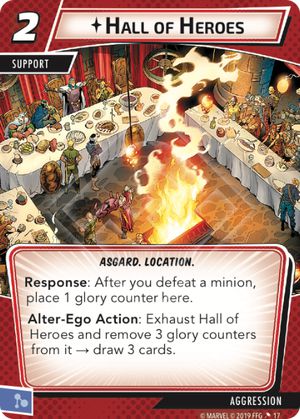This is a pretty situational card, it can be good on minion-heavy scenarios like Ultron or Green Goblin, but be a dead card on minion-light scenarios like Rhino or Absorbing Man.
FYI, the Response only triggers after "you" defeat a minion, per the latest RRG that means it triggers on you basic attacks, Hero abilities (like Retaliate), events that deal damage (like Uppercut or Preemptive Strike), and upgrades on your hero that deal damage (like Jarnbjorn or Energy Barrier).
It will NOT trigger on ally attacks, ally abilities (like the response on Nick Fury), upgrades on allies that deal damage (like Power Gloves), or on supports that deal damage (like Tac Team or Army of Ants).
